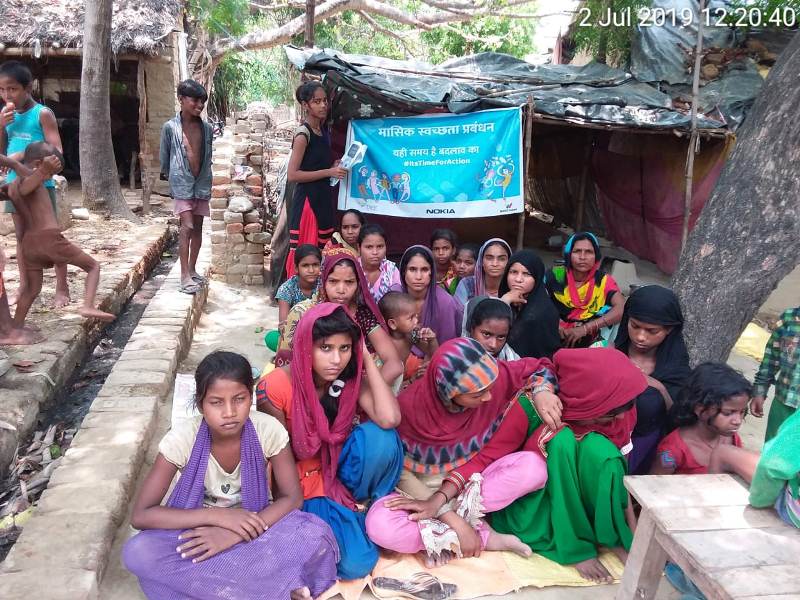 The adolescent girls in the 100 Smartpur villages had on no occasion imagined to be sitting in a group and discussing menstruation and hygiene practices and how to break the stereotype. Having never talked about the pain or the discomfort with the closest of friends, all of them were hesitant to begin a conversation about periods. But with the help of community dialogues and activity-based interactions, teenaged girls are now breaking the barriers to overcome the taboo. When on May 25, a drawing competition was announced with the theme as ‘Water, Sanitary Pads, and Menstrual Hygiene’—a lot of them though excited, were confused to be a part of this. Girls from the age group 10 – 17 were invited to participate in this competition and topics were decided with the aim of highlighting the role of clean water and sanitary pads in the maintenance of a healthy menstrual hygiene. All the participants drew on a piece of cloth on a piece of cloth with fabric colours. Later on, a video conferencing call was conducted in all the villages where the drawing competition was held to appreciate the girls for their active participation and one ‘best drawing’ was selected by each centre coordinator.
The adolescent girls in the 100 Smartpur villages had on no occasion imagined to be sitting in a group and discussing menstruation and hygiene practices and how to break the stereotype. Having never talked about the pain or the discomfort with the closest of friends, all of them were hesitant to begin a conversation about periods. But with the help of community dialogues and activity-based interactions, teenaged girls are now breaking the barriers to overcome the taboo. When on May 25, a drawing competition was announced with the theme as ‘Water, Sanitary Pads, and Menstrual Hygiene’—a lot of them though excited, were confused to be a part of this. Girls from the age group 10 – 17 were invited to participate in this competition and topics were decided with the aim of highlighting the role of clean water and sanitary pads in the maintenance of a healthy menstrual hygiene. All the participants drew on a piece of cloth on a piece of cloth with fabric colours. Later on, a video conferencing call was conducted in all the villages where the drawing competition was held to appreciate the girls for their active participation and one ‘best drawing’ was selected by each centre coordinator.
The founder and director of Digital Empowerment Foundation, Osama Manzar, also participated in the video conferencing from Germany. To further motivate the participants, he used placards to make the conference interesting and interactive and encouraged the girls to talk about menstruation with the men in their homes. These girls then shared their experiences and learnings with teammates all across India. Rama (name changed) shared, “I was very shy and hesitated while talking about periods with my friends or even with my mother. I thought it was a wrong thing and shouldn’t be talked out loud. You can say that there was a stigma attached to kt.” However, after this interactive session, she believes that she will be confidently able to talk about the pain and discomfort with her friends to begin with.
In India, Menstrual Hygiene Management is the need of the hour because around 60,000 females die due to cervical cancer, out of which 40,000 die due to sheer negligence as they don’t maintain proper menstrual health and hygiene. Unhealthy menstrual practices further generate various reproduction related diseases in almost 70% of the women population. Unfortunately, a huge percentage of women (88%) don’t use sanitary pads. About 71% of the adolescent girls come to know about menstruation only when they start with periods, which results in health related issues among approximately 12 crore adolescent girls. Even though it is believed that children are the future of the country, there still remains huge ignorance on issues related to menstrual health and hygiene. Every year about 2 crore girls’ drop out of school when they start menstruating.
A German NGO named WASH United initiated the Menstrual Hygiene Day, which is celebrated worldwide every year on 28 May to highlight the importance of good menstrual hygiene management (MHM). The aim for this initiative was to make the girls and women aware about healthy ways of maintaining menstrual health and hygiene. Since, the average length of a menstrual cycle lasts 28 days, it was decided to celebrate Menstrual Hygiene Day on 28th day in the month of May.
Digital Empowerment Foundation (DEF) believes that digital inclusion will be a big leap towards empowering young girls in breaking these taboos and stereotypes. Not only will they be able to build confidence, they will also be breaking the walls of discrimination. DEF also conducted an in-house workshop on Menstrual Hygiene Management with the members to deliver the message that periods are normal. The workshop witnessed a huge number of male participants. A short movie on menstruation was screened which was followed by a question and answer session. The audience was made aware of the various issues women go through during menstruation such as mood swings, nausea, pain in various body parts, food cravings and more. Further discussions were also done on how they can contribute to this movement by talking to their daughters, wives or female friends and colleagues about menstruation and help them in case they feel unwell during periods.
The quote by Mahatma Gandhi – ‘Be the change that you wish to see in the world’ – can truly be applied to this workshop. The level of participation in all the activities was overwhelming and encouraging as people took part in this with the perspective to bring a change. Digital Empowerment Foundation has always worked towards the betterment of the society and through Menstrual Hygiene Management it will ensure a profound change by delivering the message that ‘periods are normal’ and ‘it’s time for action’.








